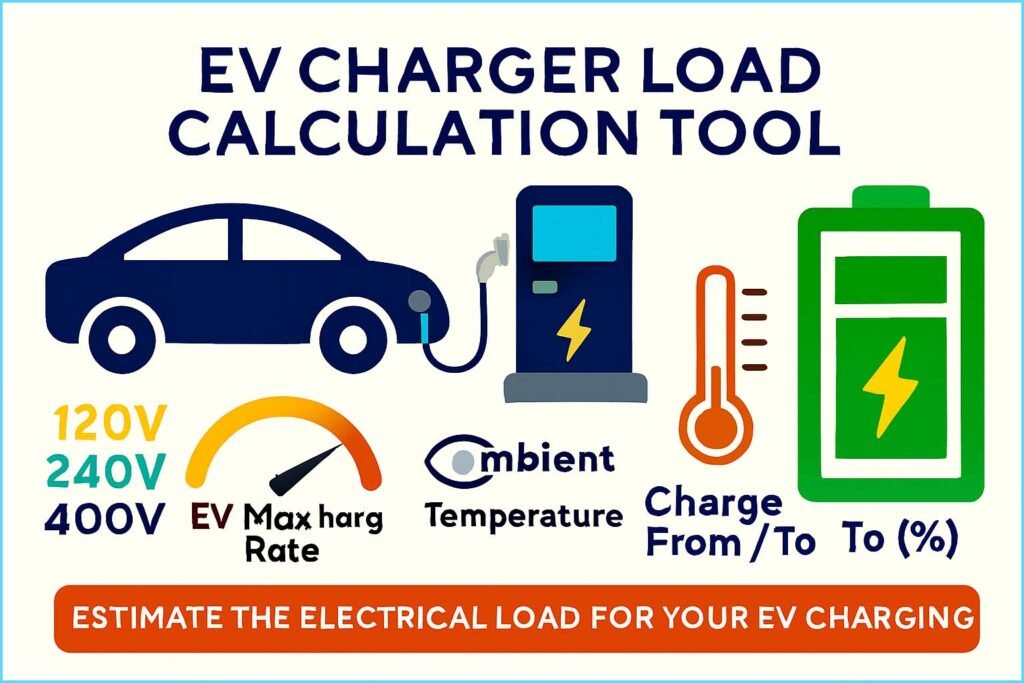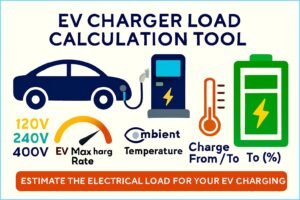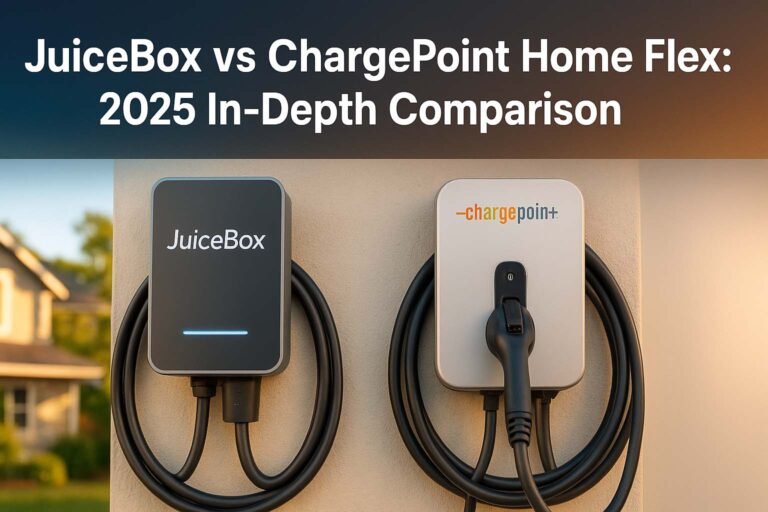EV Charger Load Calculation Tool – Accurate Power Estimation for Home and Commercial EV Chargers
Electric vehicles are transforming how we move. But as EV ownership grows, so does the need for accurate electrical planning. Before installing a charger, you must know how much load your system can handle. That’s where an EV Charger Load Calculation Tool comes in — it simplifies the entire process, helping you size your home or commercial charging setup safely and efficiently.
This guide explains everything about using an EV Charger Load Calculation Tool, how it works, what data it needs, and how it helps in planning your EV charger installation. Whether you’re an EV owner, an electrician, or a solar installer, understanding load calculations is critical to prevent circuit overloads and ensure safe charging performance.

Table of Contents
In simple terms, this tool helps you determine how many amps your EV charger will draw and whether your existing electrical setup can handle the load. It’s the starting point for every EV charging project.
Key Takeaways
- The EV Charger Load Calculation Tool helps estimate total power and current draw for EV chargers.
- It’s essential for checking whether your home’s electrical system supports EV charging.
- The tool simplifies load assessment for both residential and commercial setups.
- Knowing your EV home charger amps helps avoid breaker trips and wiring damage.
- Ideal for electricians, solar engineers, and EV owners planning charger installation.
What Is an EV Charger Load Calculation Tool?
An EV Charger Load Calculation Tool is a smart calculator that helps estimate the electrical load required to operate an EV charger safely.
It calculates how much power (in kW) and current (in amps) your EV charger will draw based on input parameters like supply voltage, charger power rating, and circuit configuration.
EV Charger Load Calculation Tool
Estimate EV charging time and electrical load based on battery specs, charger type, and environmental conditions.
How to Use: Enter your EV battery specs, charger type, and environmental conditions. The calculator will estimate charging time, load in amps, and fuse rating.
This tool helps you avoid one of the most common mistakes — installing a charger that your main panel or circuit can’t support. For instance, if your charger draws 32 amps but your home circuit is rated only for 25 amps, it could lead to constant tripping or overheating.
By using an EV charger load calculator, you can find the exact power requirement and plan upgrades if needed.
Why Load Calculation Matters for EV Chargers
When you plug in an EV, the charger becomes one of the largest electrical loads in your home. A single 7kW charger can draw around 30 amps continuously. If you already have appliances like air conditioners, refrigerators, or water heaters, your total load can exceed the main circuit limit.
That’s why load calculation is not optional — it’s mandatory for safe installation. The EV Charger Load Calculation Tool helps identify whether your existing service panel (usually 100A or 200A) can handle the additional EV load or needs an upgrade.
Accurate load calculations prevent:
- Overloading the main breaker
- Voltage drops and energy losses
- Excessive heating in cables and terminals
- Potential fire hazards
- Costly electrical repairs later
How the EV Charger Load Calculation Tool Works
The calculator works on a few simple electrical principles. You just enter values like:
- Charger power rating (in kW)
- Supply voltage (single-phase or three-phase)
- Charger efficiency (optional)
- Charger quantity
Once you input these, the EV Charger Load Calculation Tool instantly computes the total load (in kW) and current (in amps).
Here’s a simplified formula behind the tool:
| Parameter | Formula | Example (Single Phase 230V, 7kW Charger) |
|---|---|---|
| Power (kW) | P = V × I × PF / 1000 | 230 × 30.4 × 1 = 7.0 kW |
| Current (A) | I = (P × 1000) / (V × PF) | (7 × 1000) / (230 × 1) = 30.4 A |
So, if you’re installing a 7kW EV charger at 230V, the EV home charger amps would be approximately 30.4A.
The same logic applies for three-phase systems, except the formula includes √3 (1.732):
I = (P × 1000) / (√3 × V × PF)
Example (11kW, 400V, PF=1): (11000) / (1.732 × 400 × 1) = 15.9A per phase
These calculations ensure you pick the correct breaker, wire size, and fuse rating for your installation.
Example: EV Home Charger Load Calculation
Let’s take a practical example for a typical home setup:
| Parameter | Value |
|---|---|
| Charger Type | 7kW Single Phase |
| Supply Voltage | 230V |
| Power Factor | 1 |
| Charger Efficiency | 95% |
| Quantity | 1 |
Step 1: Convert Power to Current
I = (7 × 1000) / (230 × 0.95) = 32.0 A
Step 2: Add 25% Safety Margin
32.0 × 1.25 = 40A breaker required
This means you’ll need at least a 40A circuit breaker and a wire size that supports 40 amps continuous load.
If your home main breaker is 100A, and you’re already using 70A for appliances, you’ll be left with only 30A spare — which means you’ll need a load management plan or panel upgrade before installing the charger.
The EV Charger Load Calculation Tool automatically performs these steps and helps you find safe, compliant configurations.
Benefits of Using an EV Charger Load Calculation Tool
Using the EV Charger Load Calculation Tool saves time, ensures safety, and avoids guesswork. Here’s why it’s important:
- Accurate Planning: You can plan your electrical layout without overloading circuits.
- Smart Sizing: It helps select the right breaker, wire gauge, and load distribution.
- Code Compliance: Ensures your setup meets NEC/IEC standards.
- Cost Savings: Prevents expensive rework or electrical damage.
- Compatibility Check: Tells whether your home supply can handle a Level 2 charger.
Whether you’re an installer or homeowner, using an EV charger load calculator reduces installation risks and ensures your system runs efficiently.
Understanding EV Home Charger Amps
The term EV home charger amps simply means the current your EV charger draws from your electrical panel. Different chargers require different amperages:
| Charger Type | Power (kW) | Voltage | Current (Amps) | Charging Speed |
|---|---|---|---|---|
| Level 1 | 1.4 kW | 120V | 12A | 8–10 km/hour |
| Level 2 (Home) | 7.4 kW | 230V | 32A | 30–40 km/hour |
| Level 2 (Commercial) | 11–22 kW | 400V | 16–32A per phase | 50–120 km/hour |
| DC Fast Charger | 50 kW+ | 400–800V | 125A+ | 200–300 km/hour |
Understanding these numbers is critical. It helps you know how long your EV will take to charge and whether your panel can handle the required EV home charger amps.
How to Use the EV Charger Load Calculation Tool
Using the calculator is straightforward:
- Enter charger rating in kW (e.g., 7.4).
- Choose supply voltage (e.g., 230V single-phase or 400V three-phase).
- Input the number of chargers.
- (Optional) Add power factor or efficiency if known.
- The tool displays total power load (kW) and current draw (amps).
You can repeat the process for multiple chargers to plan load distribution in offices, apartments, or commercial EV charging stations.
This automation saves time and ensures you get accurate results without complex electrical math.
Applications of EV Charger Load Calculation Tool
The tool is not just for homeowners — it’s valuable across multiple industries:
- Residential Installations: For safe Level 2 home charger planning.
- Commercial EV Charging Hubs: To manage multiple chargers on a shared load.
- Solar System Integration: To balance solar inverter output and EV load.
- Industrial Fleet Management: To ensure balanced charging without tripping supply.
- Electrical Design Firms: For accurate load forecasting in smart grids.
By integrating this calculator into project design, professionals can create efficient, reliable, and code-compliant EV charging networks.
Final Thoughts
The EV Charger Load Calculation Tool is an essential resource for anyone planning to install EV charging infrastructure. It eliminates guesswork, prevents overloads, and ensures your electrical system remains efficient and safe.
Knowing your EV home charger amps helps you make informed decisions — whether it’s selecting the right wire size, circuit breaker, or panel upgrade.
As EV adoption continues to grow, tools like this play a vital role in building smarter, safer, and more sustainable charging systems.
Follow Us on Social:
Subscribe our Newsletter on Electrical Insights for latest updates from Electrical Engineering Hub
#EVChargerLoadCalculationTool, #EVChargerLoadCalculator, #EVCharger, #ElectricVehicleCharging, #EVHomeCharger, #EVChargingStation, #EVLoadCalculator, #EVPowerCalculator, #EVChargerInstallation, #EVChargingSolutions, #SmartCharging, #HomeEVCharger, #CommercialEVCharger, #EVChargerAmps, #SustainableMobility
EV Charger Load Calculation Tool – Accurate Power Estimation for Home and Commercial EV Chargers : Electrical Engineering Hub

Use our EV Charger Load Calculation Tool to accurately estimate power requirements for home and commercial EV chargers. Calculate load, amps, and capacity easily with this EV charger load calculator for safe and efficient EV charging setup
Price Currency: USD
Operating System: All
Application Category: UtilitiesApplication






